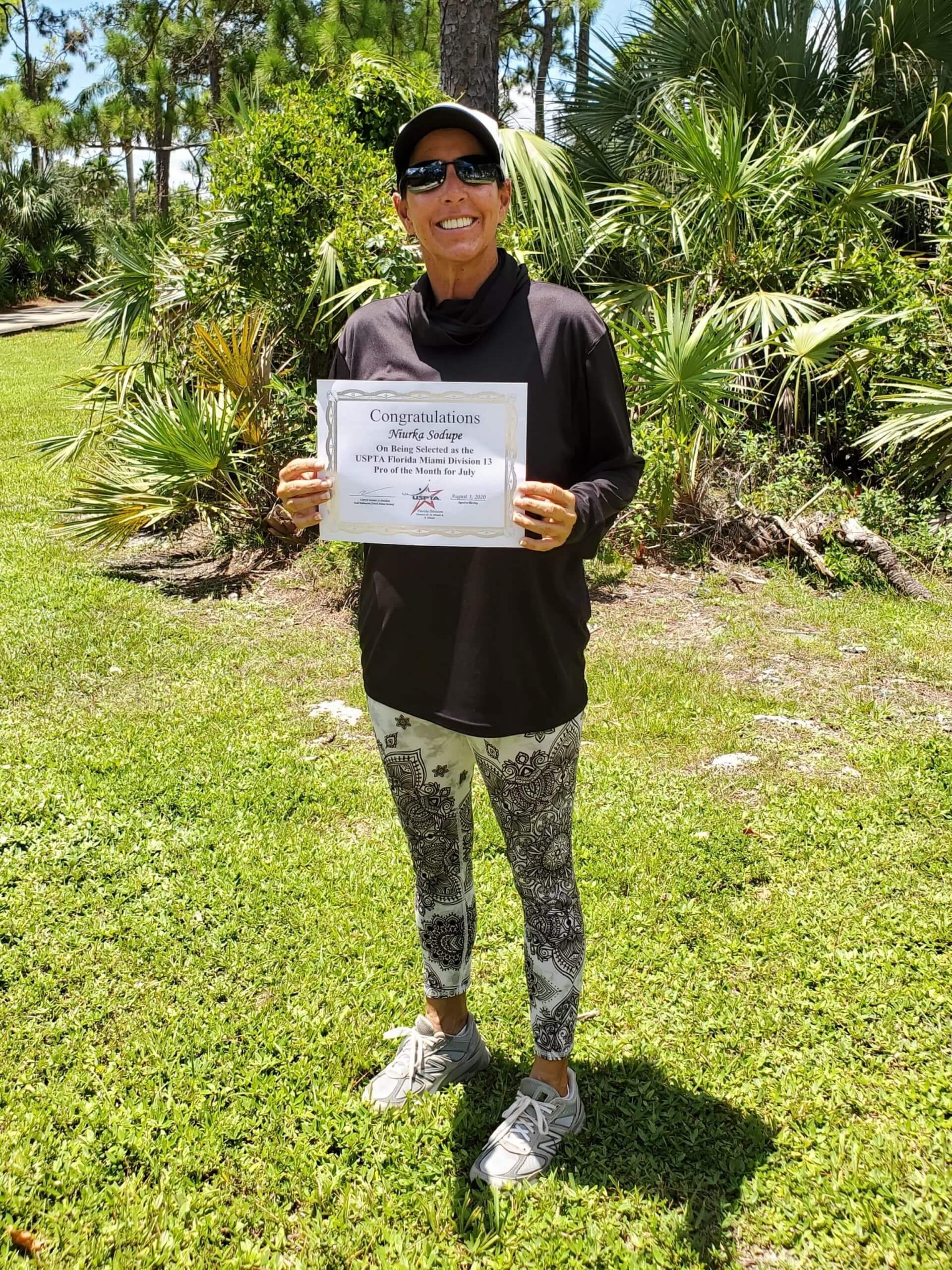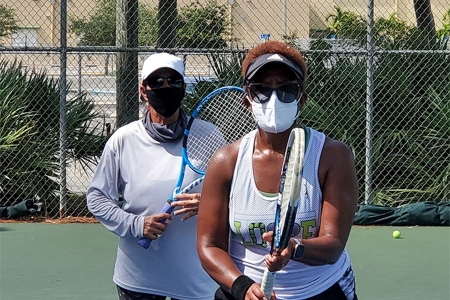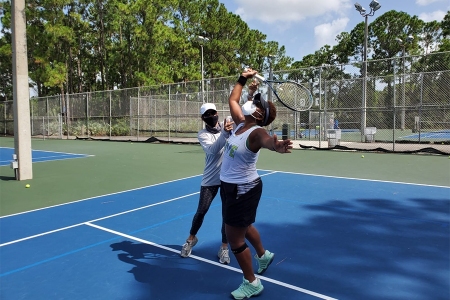Haga clic aquí para la versión en español
USTA Florida’s mission is “to promote and develop tennis for all.” As a core value, we believe in providing opportunities for everyone to participate in the game of tennis, regardless of skill, age, physical ability, gender, ethnicity, economic background or sexual orientation. As Sept. 15 – Oct. 15 is Hispanic Heritage Month, we’re taking the opportunity to celebrate the diversity of the Florida tennis community.
We want to introduce you to Miami native Niurka Sodupe. Sodupe began playing tennis when she was 6 years old, was coached by world renowned tennis legend Pancho Segura and trained at the world-famous Nick Bollettieri Tennis Academy among the likes of Andre Agassi, Jim Courier and Monica Seles. She went on to be ranked number 7 in the ITF junior rankings at just 14 years old, reach the finals of the Junior US Open in 1984, and was invited to compete in the Olympic trials that same year. She went on to compete in the WTA tour for several years and has played around the world, including in 3 Grand Slam main draws: the French Open, Wimbledon, and the US Open. Now 51 years old, Sodupe is the Head Tennis Professional at Ron Ehmann Tennis Center in Miami.

Niurka Sodupe was selected as the USPTA Miami Division 13 Pro of the Month for July 2020
How did you get involved in tennis?
My father introduced me to tennis at age 6. He was a professional baseball player in Cuba. We were always playing some sort of sport in our front yard. One day he took me to play tennis at our neighborhood park. He saw how much I enjoyed it and noticed that I had some talent. At that time, the only sports available to girls were tennis and golf. He took me to take some tennis lessons and I’ve never looked back since!
What do you enjoy most about the sport?
Tennis has taught me so much from an early age. Tennis is a sport that gives back! It’s a sport of a lifetime that allows you to stay in shape and have fun with others whether you are on a team or just playing socially. Through tennis I have learned: to always give 100 percent and that hard work pays off, responsibility, discipline, problem-solving, sportsmanship, how to be a team player and how to be a leader.
What is your current role and what do you do?
I’m the Head Tennis Pro at Ron Ehmann Tennis Center for Friends of Miami Tennis, a non-profit organization. I implement and supervise all adult and junior tennis programming and teach adults and juniors or all ages and levels. We host 18 USTA adult leagues at the facility, and I’m a USTA Tournament Director for 4 yearly USTA junior tournaments.
Does your family play tennis?
My family started playing tennis when I started playing tennis. We enjoyed playing as a family. We became members at the Marriott Tennis Club that had 11 hard courts. As a family, we would spend most of our weekends there playing tennis and cooling off in the pool.
What message do you have for parents about tennis?
Tennis is a sport for all children! Regardless of their athletic ability, they will be able to have a positive experience on the tennis court. Let’s always keep it fun at all levels! It’s a great way for the kids to stay in shape and compete in an all-around healthy environment.
What is your heritage?
My parents and grandparents were from Havana, Cuba. My great grandparents were from Spain.
Why is celebrating Hispanic heritage important to you?
I am very proud of my Hispanic Heritage. The traditions and culture have always been a big part of my life. I am who I am today because of my Hispanic upbringing. I am proud to say I am a Cuban American! It is important to me for people to know where my family comes from, how hard they worked, and how much they have contributed. We should celebrate Hispanic achievements from past to present.
How has your Hispanic heritage inspired you in tennis, or, your life in general?
My family fled Cuba in 1959 from a dictatorship. They went from having it all to nothing overnight. They arrived in the U.S. with my 2-year-old sister and whatever they could carry on the plane. They worked hard at whatever jobs they could find. My parents had to provide for my sister, my grandparents, and themselves. As a family unit, they all helped each other daily. After being here 10 years and not planning to have another child, I was born in 1969. Two years later, through hard work, my family was able to buy a modest home where my 82-year-old mother still lives today.
I was seemingly a very athletic child, so my father took me to the neighborhood park to introduce me to tennis. That’s when it all started at age 6. I went on to be a top-ranked junior, I was ranked as a professional in the top 120 in the world, I competed in the main draws of 3 of the 4 grand slams, and now I’ve been teaching the sport I love for over 25 years. I wanted to share my story because as a promising junior player moving to the professional rank – the journey is very costly. The private lessons, traveling to tournaments, staying at hotels, eating out, etc., it all adds up. Until this day I do not fully know how my family did it. My parents worked hard and my grandparents helped in any way that they could. I know the house was refinanced a couple of times and my family made sacrifices so that I could fulfill my dreams. This has always stuck with me and it has always inspired me to work hard at whatever I do! My family working together to make a new life here for them and for us is the Hispanic way!
Why is it important to celebrate Hispanic Heritage Month in general, as well as in tennis?
It is important to celebrate Hispanic Heritage month to recognize the diverse cultures and contributions Hispanics have made to this wonderful country. I also think it’s important in tennis to recognize the many Hispanic players who played before us and continue to play. It gives our Hispanic youth positive role models in tennis to look up to. My role model growing up was Pancho Segura, a tennis legend from Ecuador. He was my coach from the ages of 10 to 15. He made a big impact in my life.
Why is it important to not only support and celebrate other cultures, but be inclusive to all?
We should all support each other from every walk of life! We are here in this world to make it a better place for all!
If you had to share your message of unity, what would it be?
My message of unity would be about tennis. Tennis knows no race, color, creed, sex, or religion. It is a sport where players join each other to have fun, get some exercise and have some healthy competition. Tennis has always united players from all over the world of all levels and all ages.
To learn more about USTA Florida’s diversity initiatives, click here.




